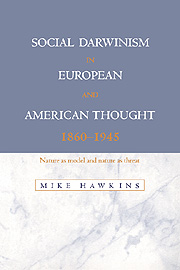Book contents
- Frontmatter
- Contents
- Acknowledgements
- Part I Defining Social Darwinism
- Part II Pioneers
- 3 The emergence of Social Darwinism
- 4 Herbert Spencer and cosmic evolution
- 5 Social Darwinism in the USA
- 6 Social Darwinism in France and Germany
- Part III Case studies
- Postscript: Social Darwinism old and new: the case of sociobiology
- Bibliography
- Index
6 - Social Darwinism in France and Germany
Published online by Cambridge University Press: 07 December 2009
- Frontmatter
- Contents
- Acknowledgements
- Part I Defining Social Darwinism
- Part II Pioneers
- 3 The emergence of Social Darwinism
- 4 Herbert Spencer and cosmic evolution
- 5 Social Darwinism in the USA
- 6 Social Darwinism in France and Germany
- Part III Case studies
- Postscript: Social Darwinism old and new: the case of sociobiology
- Bibliography
- Index
Summary
Introduction
When Darwin published the Origin, France and Germany were in the throes of socio-economic change and political conflict. In France the legacy of the Revolution was one of cleavage and political confrontation expressed in the episodes of insurrection, restoration and coup which occurred until the formation of the Third Republic. Born from the trauma of military defeat and civil war, the Republic was itself a precarious compromise that was to be riven by crises during its seventy-year history. Class divisions, provincial loyalties and the dislocative impacts of rapid industrialisation and urbanisation were compounded by an embittered antagonism between the Catholic Church and the forces of anti-clericalism. Small wonder, then, that French philosophers and social theorists were continually preoccupied with what Comte had designated the ‘seventh science’: la morale. Their aim, whatever their political predilections, was to discover an authoritative body of beliefs capable of uniting the nation around an ethical consensus. The achievements of the natural sciences ensured that many theorists would seek to emulate these disciplines in the search for models and methods that could assist in the construction of this moral concordance.
After the abortive revolution of 1848, Germany also experienced political division against a background of brisk economic growth and social change. After national unification under Bismarck, the new Reich was fraught with continuing regional differences and enmities, compounded by hostility between Protestants and a sizeable Catholic minority. Abrasive class divisions were reflected in the emergence of the largest socialist party in Europe, in addition to a sharp differentiation between rural/agrarian and urban/industrial sub-cultures.
- Type
- Chapter
- Information
- Social Darwinism in European and American Thought, 1860–1945Nature as Model and Nature as Threat, pp. 123 - 148Publisher: Cambridge University PressPrint publication year: 1997



